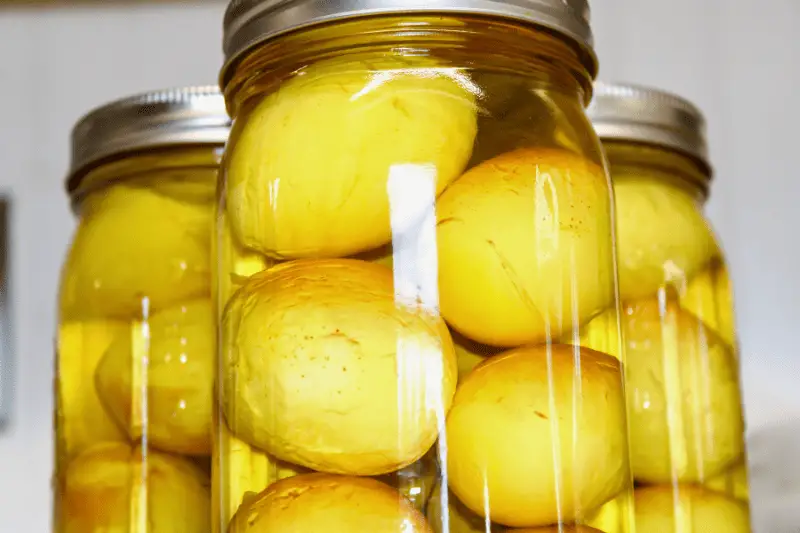Have you ever tried pickled eggs? These tangy, savory delights are a perfect combination of flavors, and the best part is, you can make them at home!
Pickling eggs is a wonderful way to preserve and enhance their taste, creating a unique treat that can be enjoyed as a snack or added to various dishes.
In this article, we will guide you through the process of pickling eggs, step by step, so you can savor the deliciousness of homemade pickled eggs.

Benefits of Pickled Eggs
Before we dive into the process, let’s take a moment to appreciate the many benefits of pickled eggs. They not only offer a burst of flavor but also provide several advantages:
- Long Shelf Life: Pickled eggs can be stored for several weeks, allowing you to enjoy them over an extended period.
- Versatility: These delightful treats can be used in salads, sandwiches, or as a standalone snack.
- Unique Taste: The tangy and slightly sour flavor of pickled eggs is a delightful change from regular boiled eggs.
- Nutritional Value: Eggs are a great source of protein, and pickling them adds beneficial probiotics from the fermentation process.
How to Pickle Eggs at Home
Before you embark on your pickling adventure, gather the following equipment and ingredients:
- Fresh eggs
- Mason jars or airtight containers
- Distilled white vinegar
- Water
- Pickling spices (optional)
- Salt
- Sugar
- Onion (optional)
- Garlic cloves (optional)
- Red pepper flakes (optional)
Step 1: Preparing the Eggs
The first step in pickling eggs is to prepare them properly. Follow these simple instructions:
Selecting and Boiling the Eggs
Choose fresh eggs that are free from cracks. Place them in a saucepan and cover with water. Bring the water to a gentle boil over medium heat. Once the water reaches a boil, reduce the heat and simmer the eggs for about 10-12 minutes. This will ensure fully cooked yolks and firm whites.
Step 2: Preparing the Brine Solution
The brine solution is a key component of pickled eggs, providing the tangy and flavorful base. Here’s how you can prepare it:
Choosing the Brine Ingredients
In a saucepan, combine equal parts of distilled white vinegar and water. The quantity will depend on the number of eggs you plan to pickle and the size of your jars. Add a teaspoon of salt and sugar to the mixture. These ingredients will balance the flavors and aid in the preservation process.
Preparing the Brine
Place the saucepan over medium heat and bring the mixture to a gentle simmer. Stir occasionally to ensure that the salt and sugar dissolve completely. Once the brine is ready, remove it from the heat and let it cool down.
Step 3: Pickling the Eggs
With the eggs boiled and the brine prepared, it’s time to start pickling!
Placing the Eggs in Jars
Carefully transfer the boiled eggs into clean mason jars or airtight containers. You can choose to peel the eggs or leave them unpeeled, depending on your preference. If desired, add slices of onion or peeled garlic cloves to the jars. These additions will infuse the eggs with additional flavors.
Adding the Brine
Pour the cooled brine solution over the eggs, ensuring that they are fully submerged. The brine will penetrate the eggs, infusing them with its delicious taste. Leave a small headspace at the top of the jar to allow for expansion during the pickling process.
Step 4: Flavoring the Pickled Eggs (Optional)
To add more depth and variety to your pickled eggs, consider flavoring them with additional spices and ingredients.
Spices and Flavorings
Experiment with various spices such as dill seeds, black peppercorns, mustard seeds, or red pepper flakes. These will infuse the eggs with unique flavors and enhance their overall taste.
Adding the Flavorings
Place the desired spices and flavorings into the jars alongside the eggs. You can customize each jar to create different combinations, allowing for a diverse array of pickled egg options.
Step 5: Sealing and Storing the Pickled Eggs
To ensure your pickled eggs stay fresh and flavorful, follow these final steps:
Sealing the Jars
Securely close the jars with their respective lids. Ensure they are tightly sealed to prevent any air from entering, which could affect the pickling process and the longevity of the eggs.
Storing the Pickled Eggs
Store the jars in a cool and dark place, such as a pantry or refrigerator. The eggs will continue to pickle and develop flavor over time. For optimal taste, let the pickled eggs marinate for at least one week before consuming them.
Tips for Perfectly Pickled Eggs
To elevate your pickling skills, consider these tips:
- Use fresh eggs to ensure the best flavor and texture.
- Let the eggs cool before peeling them to prevent sticking or damage to the whites.
- Experiment with different brine ingredients and spices to create unique flavor profiles.
- Allow the eggs to pickle for at least one week for optimal taste.
Serving and Enjoying Pickled Eggs
Once your pickled eggs have reached their desired level of pickling, it’s time to enjoy them! Here are a few serving suggestions:
- Serve pickled eggs as a standalone snack.
- Add them to salads or sandwiches for an extra tangy kick.
- Chop pickled eggs and mix them with mayonnaise to create a delicious egg salad.
Safety Precautions
While pickled eggs are delicious, it’s important to keep a few safety precautions in mind:
- Always use clean and sterilized jars to avoid contamination.
- Store pickled eggs in the refrigerator to maintain their freshness.
- Discard any pickled eggs that show signs of spoilage, such as a foul odor or mold.
Final Thoughts
Pickling eggs at home is a rewarding and flavorful experience. By following the steps outlined in this article, you can create your own delicious pickled eggs, customized to suit your taste preferences. Enjoy the tangy goodness of homemade pickled eggs and savor the burst of flavors in every bite.
FAQs
- Can I use different types of vinegar for pickling eggs? Yes, you can experiment with different types of vinegar, such as apple cider vinegar or rice vinegar, to create unique flavors in your pickled eggs.
- How long can I store pickled eggs? When stored properly in the refrigerator, pickled eggs can last for several weeks to a few months. However, it’s best to consume them within a month for optimal taste.
- Can I reuse the brine from previous batches of pickled eggs? It is generally recommended to use fresh brine for each batch of pickled eggs to ensure safety and flavor consistency.
- Can I add other vegetables to the pickling brine? While pickling eggs, you can also include other vegetables, such as beets or onions, to infuse them with the delicious flavors of the brine.
- Are pickled eggs safe to eat during pregnancy? Pregnant women should avoid consuming pickled eggs unless the eggs have been pasteurized to eliminate the risk of harmful bacteria. It’s best to consult with a healthcare professional for specific dietary recommendations during pregnancy.
